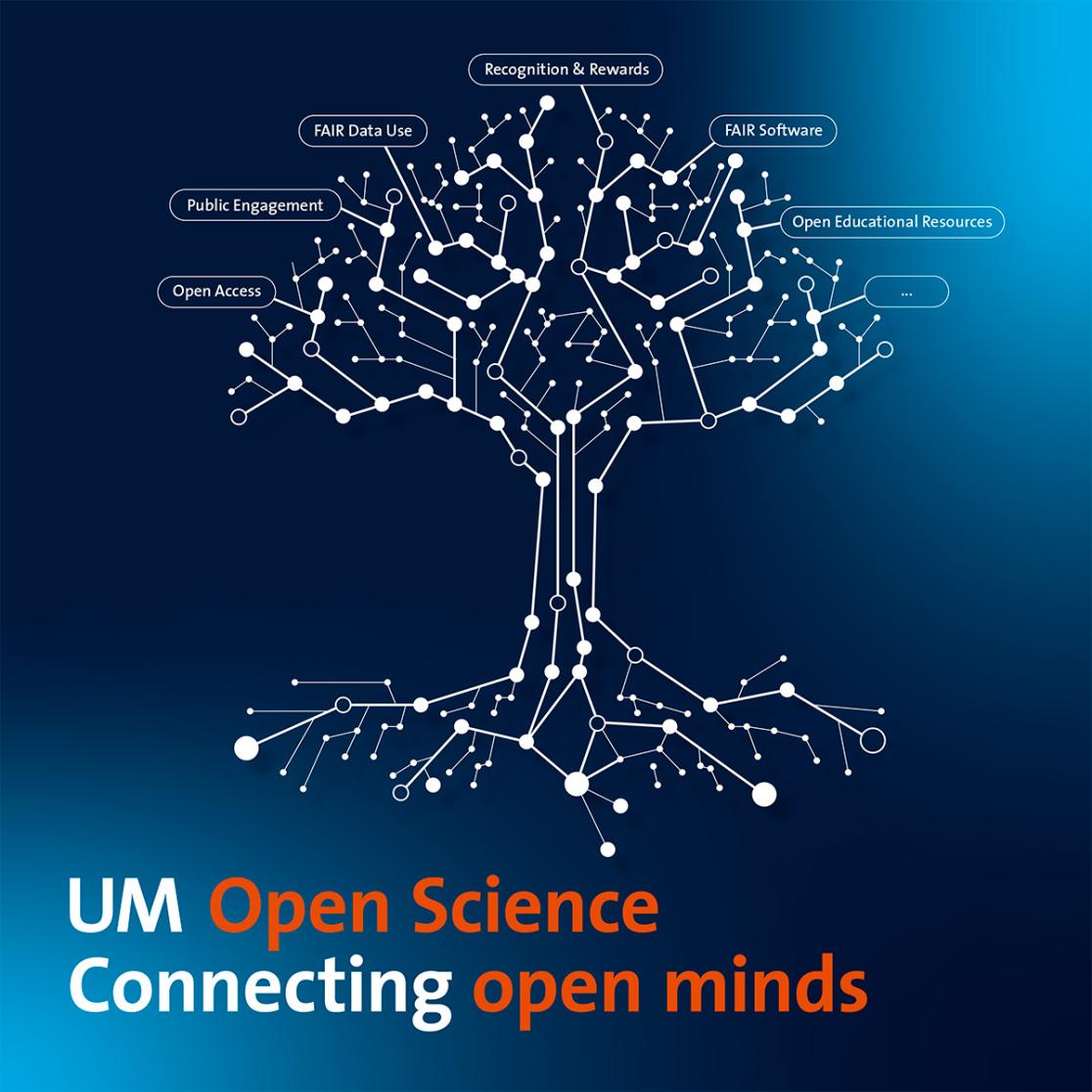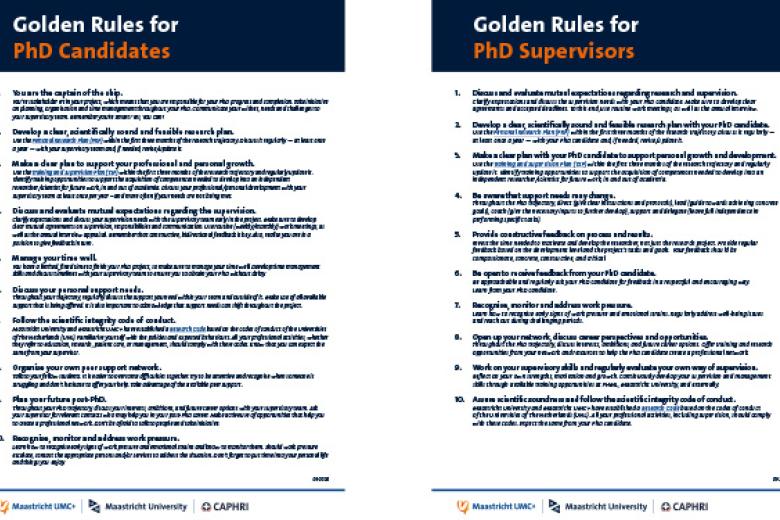During your PhD project
Supervision
Regular meetings with your supervisors are essential for discussing your work in progress, describing your findings, making joint decisions, alerting your supervisor to any challenges or problems and keeping track of the time schedule. The expertise and experience of your supervisors will guide you towards a successful completion of the PhD trajectory and an opportunity to ‚learn on the job‘. At the start of your project, we recommend that you and your supervisory team discuss how often you will have meetings with your daily supervisor and with your promoter and, if applicable, the co-supervisors and agree on how you will work: e.g. how long in advance you should send the agenda and your work in progress, etc.. It is also advised to make minutes of each meeting and share these with your team. In the Regulations for obtaining the doctoral degree at Maastricht University and in chapter six of the Maastricht UMC+ Research Code, you can find more information on the responsibilities of supervisors and you as junior researcher and guidelines for authorships.

It takes two to tango
The supervision quality and relationship between you and your supervisors are important, in order to get the best out of your PhD trajectory and personal development. CAPHRI has published a booklet on PhD supervision: It takes two to tango: A qualitative study amongst PhD candidates and supervisors to evaluate the process of PhD supervision in the Netherlands. The booklet includes ‘10 golden rules’ cards for PhD candidates and supervision. You can download the booklet here.
The FHML/MUMC+ ‘Golden Rules’ for both PhD candidates and supervisors have been developed and updated (2024).
Download the 10 golden rules for PhD candidates and their supervisors here
Progress evaluation
In order to ensure you are making satisfactory progress and are receiving appropriate levels of supervision, training and support, your progress will be monitored at regular stages throughout your PhD trajectory. In addition to your own responsibility, your supervisors also have the responsibility to keep track of your progress and communicate with you about this at least once a year. Also, both you (once a year) and your supervisors (twice a year) are requested to report on your progress via our PhD TRACK monitoring system.
Annual assessment interviews
PhD candidates who are employed by Maastricht University as internal PhD candidate (UFO profile: Promovendus) are assessed in the 10th month of their PhD research and subsequently, at the end of every PhD-year. The first assessment interview takes place in the presence of the PhD supervisor(s), the PhD candidate and the HR advisor and determines whether the appointment will be extended for the next three years of the PhD trajectory (go/no-go decision). This information sheet will help you to prepare these assessment interviews. The subsequent assessment meetings are with your supervisors and generally planned by the secretariat of your Department. PhD candidates who are employed at Maastricht University or MUMC+ in a different kind of profile (e.g. researcher or health professional), will have annual appraisal meetings, similar to all other staff of these organisations. Contract and external candidates are strongly advised to also plan an evaluation with their supervisors every year. All types of PhD candidates are invited to do so via reminders sent out by PhD TRACK. TRACK will request you to fill out an annual questionnaire which prepares you for your annual assessment or evaluation meeting.
Monitoring your progress in the PhD TRACK system
The PhD TRACK system monitors the progress of PhD trajectories and the quality of PhD supervision. Supervisors and PhD candidates can access PhD TRACK on https://caphri.track.maastrichtuniversity.nl.
At the start of your project, TRACK will request you to fill out the Declaration of scientific integrity and your PRP and TSP digitally. These are compulsory to upload in TRACK. In addition, you can upload documents (e.g., CV, course certificates, articles, and your preliminary thesis) in Document folders in TRACK to create a portfolio. You are also requested to complete an annual questionnaire on your progress, your perceived workload and satisfaction with each of your supervisors via the PhD TRACK system. This questionnaire prepares you for your annual assessment or evaluation interview.
Your supervisors have access to your general data, but not to the confidential parts of the questionnaires. Supervisors receive feedback on their performance, but only anonymously, if more than four different PhD candidates have assessed them on eleven items in the questionnaires. Twice a year, your supervisors assess the progress of your project via the PhD TRACK system.
The data of all PhD candidates and their supervisors in PhD TRACK are securely stored on an FHML server. TRACK is available anytime, anywhere via the internet. PhD TRACK is managed by the PhD coordinator, who is the only person having full access to the data, also to the confidential parts in which the supervisors are scored, so that the PhD coordinator can provide help in case you experience problems. When you notice incorrect or incomplete information, or you would like to use a different e-mail address, please notify the PhD Administrative Coordinator.
Personal and professional development
UM Graduate School Training programme
Our university has developed a Graduate School Training programme to support your current research and to prepare young researchers for a future in science. The programme consists of different courses on three highly relevant themes, namely:
(1) Research Ethics & Integrity;
(2) Open Science;
(3) Impact & Science Communication.
All three courses are available online and can be followed individually. In addition, per theme interactive, interdisciplinary sessions are organised, where you share your experiences, applied to your own research, with fellow PhD students.
Because of the foundational nature of these courses, CAPHRI warmly invites all CAPHRI PhD candidates to this programme, as this could benefit PhD candidates that have just started, as well as PhD candidates at a more advanced stage of their PhD track.
Due to academic importance of these topics, CAPHRI expects all Phd candidates who have started their PhD trajectory from 1 November 2021 on to engage in this programme during their first year. If you consider yourself already experienced in these topics, e.g., via Research Master courses previously attended, we invite you to discuss this with your team of supervisors and jointly decide whether these courses may or may not be of added value to your career. All team decisions made regarding (not) following and planning these courses can be included and justified in your personal Training and Supervision Plan (TSP).
Basic course Regulations and Organisation for Clinical Researchers (BROC)
The BROC is intended for clinical researchers who conduct research falling under the ‘Wet medisch-wetenschappelijk onderzoek met mensen (WMO)’. For this kind of research, a GCP certificate is obligatory. The ‘Clinical Research (ICH-GCP)’ training is offered in Dutch and English. For more information on the new eBrok course have a look on www.nfu-ebrok.nl or contact the Clinical Trial Center Maastricht (www.ctcm.nl). Contact person is Arno Skrabanja, tel. +31 43 3872919. An alternative GCP course is offered here.
Master modules
CAPHRI PhD candidates can follow Master modules as PhD course. The courses are to be paid using the PhD‘s course budget, and vary in price. More information can be found at UM Master's programmes or FHML Master modules.
CaRe PhD training
The Netherlands School of Public Health and Care Research (CaRe) is a cooperation between four Dutch research institutes; Amsterdam Public Health (APH), CAPHRI, Nivel and Radboud Institute for Health Sciences (RIHS). Courses can be followed at APH and Radboud as well. The courses are to be paid using the PhD‘s course budget, and vary in price.
FHML PhD courses
The FHML offers PhD candidates courses in quantitative and qualitative research methods and lab skills. Most of them are free of charge if you are registered as FHML (CAPHRI) PhD candidate.
Language Centre
The Language Centre offers an English Academic Skills programme, which will help you conduct your research and write your dissertation.
- PhD-1&2 Academic writing (beginner/advanced, preferred for PhDs based at UM/MUMC+)
- PhD-1&2 Critical writing online (beginner/advanced, preferred for external PhDs)
- PhD-4 Presentations.
A maximum of 3 courses of the Language Center are free of charge in case you are employed or registered as FHML PhD candidate. No-show or late cancelling will mean charging of costs to your supervisor's budget.
Staff Career Centre
The Staff Career Centre offers career guidance as well as courses and workshops to develop your transferable skills such as personal effectiveness, presentation, assertiveness and self-management skills. Note that these courses are only open for PhD candidates who are employed by UM/MUMC+ and half of the costs should be paid from the PhD‘s course budget. The Staff Career Centre also offers personal coaching that is related to your work.
Library courses
The University Library offers workshops and courses such as Literature search, EndNote, Data management, Web of Science and What journal to publish in? These courses are free for all CAPHRI PhDs, by subscribing with your FHML ID number. The library also offers (online) tutorials to improve your academic information skills. If you have questions you can contact Henrietta Hazen (h.hazen@maastrichtuniversity.nl).
Teaching opportunities
Internal PhD candidates are expected and encouraged to fulfill educational roles at Maastricht University, such as tutor, block planning group member, skills teacher, supervisor of a student, etc. for about 10% of their appointment. These teaching activities should be listed in their TSP. FHML offers Short courses and University Teaching Qualification (UTQ) free of charge to teaching staff, including PhD candidates, in Dutch and English. For those who do teaching activities at Maastricht University, the Tutoring Training is compulsory. Contract (Scholarship) or external PhD candidates may also request to execute teaching activities if they are based at or near Maastricht or provide teaching activities at their own organisation. These can be included in TRACK and in their TSP. If you would like to know more about your teaching opportunities, discuss this with your supervisors and if they agree, ask for the contact details of your department‘s educational coordinator.
Applying for teaching positions is done informally through contact with your supervisors and course coordinators, and need to be formally registered in BROS. At different times throughout the year, but particularly between April and June, many teaching positions are posted, and you will have an opportunity to apply.
CAPHRI ResearchTalent programme
For “high potential” junior researchers CAPHRI offers a ResearchTalent Programme. Selected PhD students (in the 3rd or 4th year of the PhD programme) and postdocs are offered training to strengthen their academic CV, grant writing skills and further develop their own research ideas with the aim to increase their chances of obtaining personal grants. The programme consists of workshops, (individual) training sessions and outreach activities. Candidates can be nominated by their direct supervisor or department chair. Visit the webpage for more information or contact Vivian Braeken, CAPHRI's Funding Advisor, v.braeken@maastrichtuniversity.nl.
PhD courses, workshops and trainings
Quality assurance and integrity
CAPHRI values the quality of its research and has therefore established a quality assurance system, has a quality officer and offers guidelines for research conduct and auditing. The quality assurance system is available on our website and serves to help you to do your research according to the existing rules and regulations. Often it is difficult to find out exactly which regulations apply to your research. On the website you will find an overview of all the regulations that are important for research at CAPHRI (e.g., ethics approval, data protection and storage). If you have questions regarding quality assurance, please send your email to David Shaw (Quality Officer CAPHRI): d.shaw@maastrichtuniversity.nl.
CAPHRI endorses the Research Code Maastricht UMC+, which is in line with Netherlands Code of Conduct for Research Integrity.
Open science
UM endorses the principles of Open Science, offering its academics support to put these principles into practice and make science "as open as possible, as closed as necessary". The following themes are important spearheads in UM's Open Science policy: FAIR data use, Open Access, Recognising and rewarding scientists in a different way.
Read more about UM's Open Science policy
Open access
UM encourages open access publication of research, in accordance with national policy. More info about open access can be found on this UM Library page on Open Access. Maastricht University has agreements with many scientific publishers, allowing Maastricht University researchers and PhD candidates (internal and external) to publish open access free of charge. PhD candidates can check whether an agreement exists with a journal/publisher that they want to publish in, meaning that a reduced or no fee needs to be paid. You can search for journals using the following Open Access Journal Browser.

